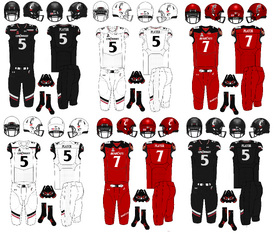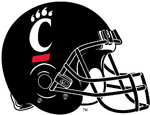| Cincinnati Bearcats football | |||
|---|---|---|---|
| Current season: | |||
| |||
| First season | 1885 | ||
| Head coach | Scott Satterfield | ||
| 2nd year, 3–9 (.250) | |||
| Home stadium | Nippert Stadium | ||
| Stadium capacity | 40,000[1] | ||
| Stadium surface | UBU Sports' Speed Series S5-M | ||
| Location | Cincinnati, Ohio | ||
| Conference | The American | ||
| Division | East | ||
| Past conferences | MVC (1957–1969) Independent (1970–1995) C-USA (1994–2003) Big East (2005-2012) | ||
| All-time history | |||
| All-time record | 621–589–50 (.513) | ||
| Postseason bowl record | 9–9–0 (.500) | ||
| Conference titles | 14 (BAA: 2, MAC: 4, MVC: 2, C-USA: 1, Big East: 4, AAC: 1) | ||
| Rivalries | Miami (OH) RedHawks (rivalry) Louisville Cardinals (rivalry) Pittsburgh Panthers (rivalry) | ||
| Consensus All-Americans | Template:American college football All-Americans | ||
| Current uniform | |||
 | |||
| Colors | Red [2] and Black[2]
| ||
| Fight song | "Cheer Cincinnati" | ||
| Marching band | University of Cincinnati Bearcat Bands | ||
| Outfitter | Under Armour | ||
| Website | gobearcats.com | ||
The Cincinnati Bearcats football team represents the University of Cincinnati, located in Cincinnati, Ohio. The Bearcats are a member of the NCAA FBS Big 12 Conference and play their home games at Nippert Stadium in Cincinnati. For the 2014 season, the Bearcats played their home games at Paul Brown Stadium while their present stadium, Nippert Stadium was undergoing renovations. The Bearcats are currently coached by Luke Fickell.
History[]
The Bearcats have an all-time record of over .500 as of 2018, having reached their 600th program victory in 2017. The team has had a bit of a resurgence in the past few years, going 98-56 since 2006, along with 9 bowl game appearances, 5 conference titles, two BCS Bowl berths, and 22 NFL Draft selections.
Robert Burch served as Cincinnati's head coach from 1909-1911, compiling a record of 16–8–2.[3] It was during his tenure that Cincinnati joined the Ohio Athletic Conference, where they would remain until 1927.[4]
In March 1927, George Babcock was hired as a professor of athletics and physical training at the University of Cincinnati.[5] From 1927 to 1930, he was the head football coach of the Bearcats football, compiling a 12–21–3 record.[6]
Sid Gillman, a member of the College and National Football League hall of fame shrines, was the architect of one of the top eras of Cincinnati football history. He directed the Bearcats to three conference titles and a pair of bowl game appearances during his six seasons (1949–54) before leaving for the professional ranks. Cincinnati, with Gillman developing the passing offenses which would make him successful in the pro ranks, became known for its aerial attack in the early 1950s.[7]
In 1968, under then head coach Homer Rice, the Bearcats were the nation's top passing team. Quarterback Greg Cook was the NCAA's total offense leader with receiver/kicker Jim O'Brien the national scoring champ. A year later, Cook earned Rookie of the Year honors as a Cincinnati Bengal. Two years later, O'Brien kicked the game-winning field goal for the Baltimore Colts in the Super Bowl.[7]
Logos/Helmets/Uniforms[]
Image gallery[]
Affiliations[]
- 2023-present - Big 12 Conference
- 2013-2022 - American Athletic Conference
- 2005-2012 - Big East Conference
- 1996-2004 - Conference USA
- 1970-1995 - NCAA 1-A independent
Seasons[]
2020s[]
| Season | Coach | Record |
|---|---|---|
| 2024 | Scott Satterfield | |
| 2023 | Scott Satterfield | 3-9 |
| 2022 | Luke Fickell; Kerry Coombs | 9-4 |
| 2021 | Luke Fickell | 13-1 |
| 2020 | Luke Fickell | 9-1 |
2010s[]
| Season | Coach | Record |
|---|---|---|
| 2019 | Luke Fickell | 11-3 |
| 2018 | Luke Fickell | 11-2 |
| 2017 | Luke Fickell | 4-8 |
| 2016 | Tommy Tuberville | 4-8 |
| 2015 | Tommy Tuberville | 7-6 |
| 2014 | Tommy Tuberville | 9-4 |
| 2013 | Tommy Tuberville | 9-4 |
| 2012 | Butch Jones | 10-3 |
| 2011 | Butch Jones | 10-3 |
| 2010 | Butch Jones | 4-8 |
2000s[]
| Season | Coach | Record |
|---|---|---|
| 2009 | Brian Kelly; Jeff Quinn | 12-1 |
| 2008 | Brian Kelly | 11-3 |
| 2007 | Brian Kelly | 10-3 |
| 2006 | Mark Dantonio; Brian Kelly | 8-5 |
| 2005 | Mark Dantonio | 4-7 |
| 2004 | Mark Dantonio | 7-5 |
| 2003 | Rick Minter | 5-7 |
| 2002 | Rick Minter | 7-7 |
| 2001 | Rick Minter | 7-5 |
| 2000 | Rick Minter | 7-5 |
1990s[]
| Season | Coach | Record |
|---|---|---|
| 1999 | Rick Minter | 3-8 |
| 1998 | Rick Minter | 2-9 |
| 1997 | Rick Minter | 8-4 |
| 1996 | Rick Minter | 6-5 |
| 1995 | Rick Minter | 6-5 |
| 1994 | Rick Minter | 2-8-1 |
| 1993 | Tim Murphy | 8-3 |
| 1992 | Tim Murphy | |
| 1991 | Tim Murphy | |
| 1990 | Tim Murphy |
1980s[]
| Season | Coach | Record |
|---|---|---|
| 1989 | Tim Murphy | 1-9-1 |
| 1988 | ||
| 1987 | ||
| 1986 | ||
| 1985 | ||
| 1984 | ||
| 1983 | ||
| 1982 | ||
| 1981 | ||
| 1980 |
References/notes[]
- ↑ CollegeGridirons.com. Nippert Stadium. Archived from the original on 2010-09-07. Retrieved on 2010-08-28.
- ↑ 2.0 2.1 Brand Color (UC Official Team Colors - via PDF file). UC.edu.
- ↑ Cincinnati Football History Database. Nationalchamps.net. Archived from the original on 2017-07-04. Retrieved on 2017-06-19.
- ↑ Archived copy. Archived from the original on 2016-04-01. Retrieved on 2017-02-20.
- ↑ "Babcock Appointed", March 12, 1927.
- ↑ George Babcock Records by Year. College Football Data Warehouse. Archived from the original on October 13, 2011. Retrieved on October 29, 2011.
- ↑ 7.0 7.1 Cite error: Invalid
<ref>tag; no text was provided for refs namedgobearcats.com


